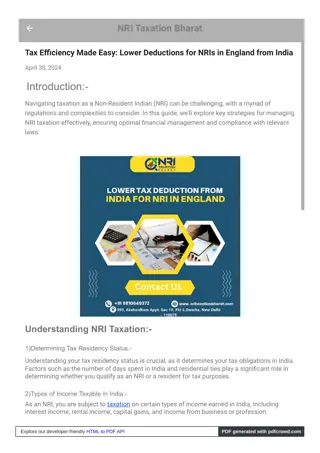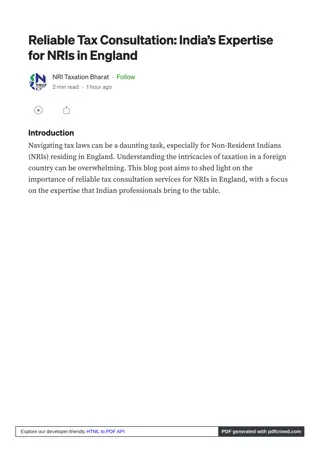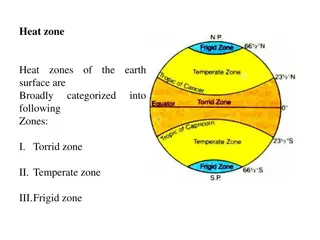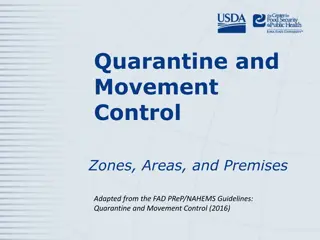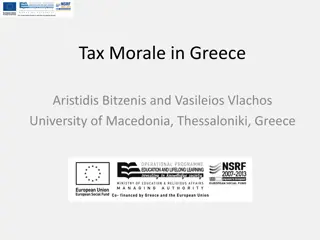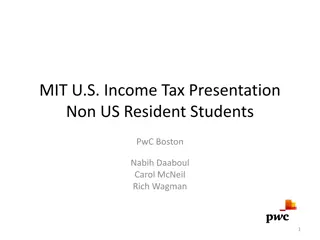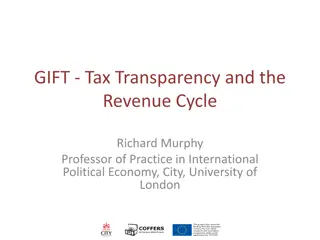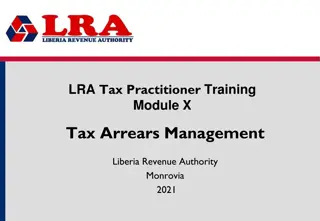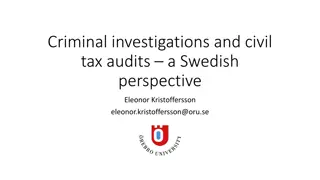Understanding Qualified Opportunity Zones Tax Benefits
Qualified Opportunity Zones (Opportunity Zones) offer tax incentives to investors who reinvest capital gains in designated low-income communities. By utilizing Qualified Opportunity Funds (QOF), investors can benefit from capital gains deferral, partial gain exclusion, and full gain exclusion on appreciation after holding the investment for 10 years. Examples illustrate how these tax benefits work over different timeframes.
Download Presentation

Please find below an Image/Link to download the presentation.
The content on the website is provided AS IS for your information and personal use only. It may not be sold, licensed, or shared on other websites without obtaining consent from the author. Download presentation by click this link. If you encounter any issues during the download, it is possible that the publisher has removed the file from their server.
E N D
Presentation Transcript
Qualified Opportunity Zones David Peteler August 7, 2019
What are they? Qualified Opportunity Zones (Opportunity Zones) were created by Congress in the 2017 Tax Cuts and Jobs Act to stimulate investment in low- income communities throughout the US Investments in Opportunity Zones must be made through a partnership or corporation, commonly known as Qualified Opportunity Fund (QOF) Federal tax incentives: Capital gain deferral and partial gain exclusion on realized gains reinvested in Opportunity Funds Full gain exclusion on appreciation of the Opportunity Fund itself - if the investment is held for 10 years
Overview of Tax Benefits 1. Capital Gains Deferral: Realized capital gains that are reinvested in an Opportunity Fund within 180 days can be deferred from taxable income until the earlier of December 31, 2026 or the date the Opportunity Fund is disposed of. The existing investment can include publicly traded stock, business assets, personal assets or any other property qualifying for capital gain tax treatment. 2. Step-up in Cost Basis: An investor can exclude up to 10% of the original realized gain if the Opportunity Fund is held for five years and up to 15% of the original gain if the Opportunity Fund is held for seven years. In other words, just 85% of the original gain will be included in taxable income if the Opportunity Fund is held for seven years. 3. Tax Forgiveness on Capital Appreciation: If an Opportunity Fund is held for ten years or more, the investor may elect to treat the cost basis as equal to the fair market value. The election permits an investor to exclude any gain on the sale of the Opportunity Fund from taxes.
Example of Tax Benefits Jan. 2, 2019 Taxpayer enters into a sale that generates $1M of capital gain June 30, 2019 (Within 180 days), Taxpayer contributes entire $1M of capital gain to a Qualified OpportunityFund Taxpayer is deemed to have a $0 basis in its QOF investment QOF Invests the $1MM in Qualified Opportunity Zone Property 2019 2020 2021 2022 2023 2024
Example of Tax Benefits June 30, 2029 (after 10 years), Taxpayer sells its investment for $2.0MM. Basis in the investment is deemed to be FMV. The effect is no tax on appreciation in investment. Jan 30, 2026 (After 7 years), Taxpayer s basis in investment in QOF increases from $100k to $150k June 30, 2024 (After 5 years), Taxpayer s basis in investment in QOF increases from $0 to $100k TAX EVENT Dec. 31, 2026 $850K of the 1MM of deferred capitalgains are taxed and the basis in QOF investment increases to $1MM. 2029 2024 2025 2026 2027 2028
Qualified Opportunity Fund Statutory Requirements Corporation, Partnership or LLC Organized for the purpose of investing in Qualified Opportunity Zone Property (QOZP) 90% of Assets Must Be Invested in QOZP Property (including ownership equity in QOZ Business) Include purpose as QOF in organizational documents
Certification Process for QOF Eligible taxpayer self-certifies to become a certified QOF No IRS approval or action is required File Form 8996 with federal income tax return for the taxable year The return must be filed timely, taking extensions into account
Qualified Opportunity Zone Businesses (QOZB) A trade or business in which: At least 70% of the tangible property owned or leased is qualified opportunity zone business property (QOZBP) Substantial portion of intangible property is used in active conduct of business At least 50% of its income is derived from active conduct of the QOZ business < 5% of its assets are nonqualified financial property (debt, stock, cash) Exceptions: Working capital designated in writing for the acquisition, construction or substantial improvement of tangible property in a QOZ and spent within 31 months of receipt Reasonable amount of working capital with a term of less than 18 months Can t be a Sin Business
Qualified Opportunity Zone Business Property (QOZBP) Tangible property used in a trade or business Includes working capital designated in writing for the acquisition, construction or substantial improvement of tangible property in a QOZ and spent within 31 months of receipt Acquired by purchase from an unrelated party (20% standard) after December 31, 2017 During substantially all of holding period, substantially all the use is in a QOZ Original use in the QOZ commences with the taxpayer OR taxpayer substantially improves the property during any 30-month period after acquisition, double the original basis of the property value of land is ignored for purpose of substantial improvement
Qualified Opportunity Zone Property QOF 90% 90% Qualified Opportunity Zone Qualified Opportunity Zone Partnership Partnership Interest (Qualified Opportunity Zone Business) Qualified Opportunity Zone Qualified Opportunity ZoneStock (Qualified Opportunity Zone Business) Stock Interest 90% 70% 70% Qualified Opportunity Zone Qualified Opportunity Zone Business BusinessProperty Property
Real Estate Fund Structure Fund Sponsor Fund Investors LP Interests $ Management Services $ GP Interest $ Opportunity Fund Majority Interest $ Project-level Services - Third Party & Joint Venture Minority Equity - Local Community Partner - First mortgage construction loan, permanent loan - Subordinated financing - Tax Credit / Municipal Financing Subsidy Project Level Manager (3rd Party or Affiliate of Fund Sponsor) Project-level fees for services, as required
Questions? David Peteler Avisen Legal dpeteler@avisenlegal.com (612) 584-3405 Avisen Legal, P.A.| 612-584-3400 | www.avisenlegal.com |
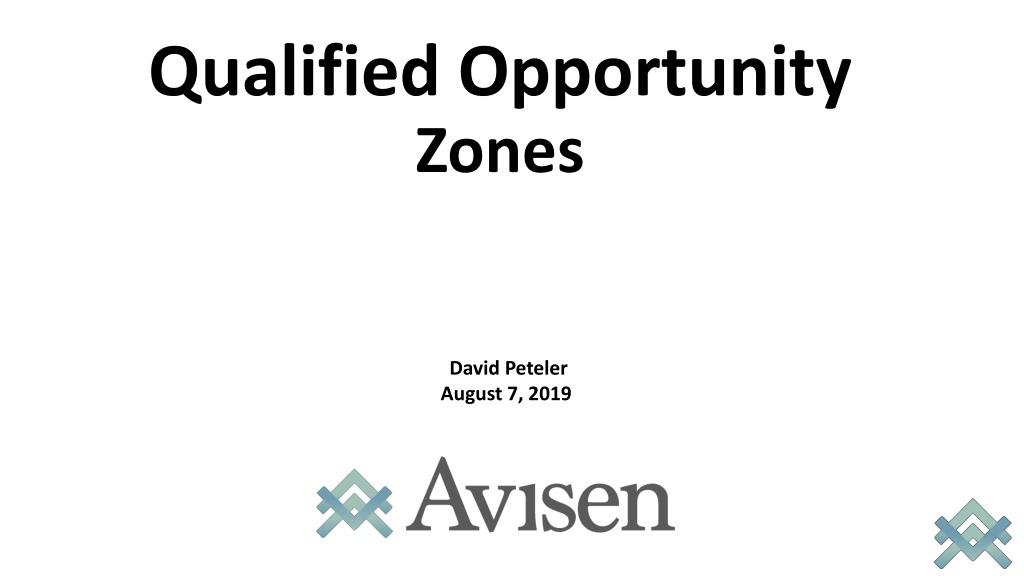


![Town of [Town Name] Real Estate Tax Rates and FY 2024 Budget Summary](/thumb/62211/town-of-town-name-real-estate-tax-rates-and-fy-2024-budget-summary.jpg)

